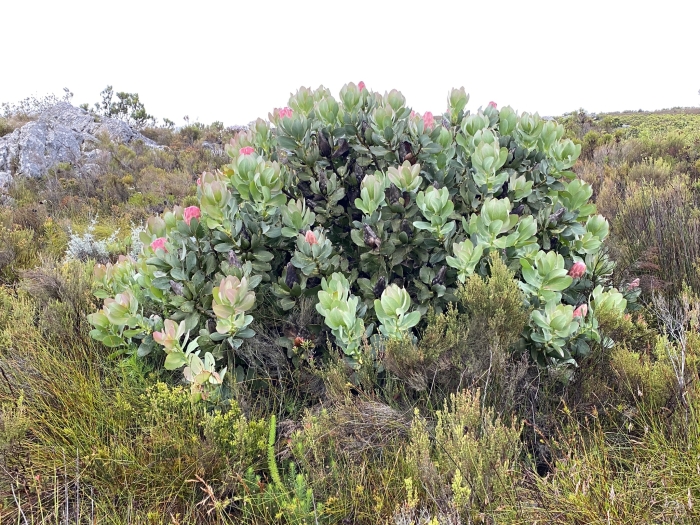Rooisuikerbos
(Protea grandiceps)
Rooisuikerbos (Protea grandiceps)
/
/

Dave U
CC BY 4.0
Image By:
Dave U
Recorded By:
Copyright:
CC BY 4.0
Copyright Notice:
Photo by: Dave U | License Type: CC BY 4.0 | License URL: http://creativecommons.org/licenses/by/4.0/ | Rights Holder: Dave U | Publisher: iNaturalist | Date Created: 2020-12-11T12:59:36Z |



















Estimated Native Range
Summary
Protea grandiceps, commonly known as Rooisuikerbos or Red Sugarbush, is an evergreen shrub native to the fynbos region of the Western Cape in South Africa, where it thrives in mountainous areas with well-drained, acidic soils. This species is adapted to a Mediterranean climate with wet winters and dry summers. It typically grows to a height of 2 meters (6 feet 7 inches) and features a rounded form. The plant is known for its striking flowers, which are large and cone-shaped with red to pink bracts, blooming from September to January. The flowers are very showy and attract a variety of bird species, which are the primary pollinators.
Red Sugarbush is valued for its unique and ornamental flowers, making it a popular choice for gardeners looking to add a touch of exotic flair. It is often used in rockeries, native plant gardens, and as a specimen plant in Mediterranean-style landscapes. Protea grandiceps requires little maintenance once established and is drought-tolerant, though it does not tolerate frost well. It prefers full sun exposure and requires well-drained, acidic soil. After fires, which are common in its native habitat, the plant regenerates from seeds that are released from serotinous capsules, an adaptation to fire-prone environments. However, in cultivation, it is important to protect this plant from fire.CC BY-SA 4.0
Red Sugarbush is valued for its unique and ornamental flowers, making it a popular choice for gardeners looking to add a touch of exotic flair. It is often used in rockeries, native plant gardens, and as a specimen plant in Mediterranean-style landscapes. Protea grandiceps requires little maintenance once established and is drought-tolerant, though it does not tolerate frost well. It prefers full sun exposure and requires well-drained, acidic soil. After fires, which are common in its native habitat, the plant regenerates from seeds that are released from serotinous capsules, an adaptation to fire-prone environments. However, in cultivation, it is important to protect this plant from fire.CC BY-SA 4.0
Plant Description
- Plant Type: Shrub
- Height: 8-10 feet
- Width: 4-6 feet
- Growth Rate: Slow
- Flower Color: Pink, Red
- Flowering Season: Spring
- Leaf Retention: Evergreen
Growth Requirements
- Sun: Full Sun
- Water: Low
- Drainage: Fast
Common Uses
Bee Garden, Bird Garden, Butterfly Garden, Drought Tolerant, Hummingbird Garden, Low Maintenance, Showy Flowers
Natural Habitat
Fynbos region of the Western Cape in South Africa, particularly in mountainous areas with well-drained, acidic soils
Other Names
Common Names: Rooisuikerbos, Suikerbos
Scientific Names: , Protea grandiceps,
GBIF Accepted Name: Protea grandiceps Tratt.